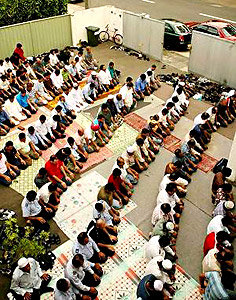 The Barelwi Ulama Movement is a reform movement of Sunni Sufism in British India that was founded by Ahmed Raza Khan of Bareilly, Rohilkhand India. Barelvis are an extensive portion of the Hanafi Muslim communities in India, Pakistan, Bangladesh, South Africa and also the United Kingdom. This community also has its presence in other places around the world. Ahmad Raza Khan was the pivotal figure around which the Barelwi Ulama Movement was promoted in the Indian subcontinent between the 19th and 20th centuries and thus earned numerous followers and opponents.
The Barelwi Ulama Movement is a reform movement of Sunni Sufism in British India that was founded by Ahmed Raza Khan of Bareilly, Rohilkhand India. Barelvis are an extensive portion of the Hanafi Muslim communities in India, Pakistan, Bangladesh, South Africa and also the United Kingdom. This community also has its presence in other places around the world. Ahmad Raza Khan was the pivotal figure around which the Barelwi Ulama Movement was promoted in the Indian subcontinent between the 19th and 20th centuries and thus earned numerous followers and opponents.
The name Barelvi came into use to indicate the followers of Ahmad Raza Khan. The terms Nuri and Barkati depict the Sufi Tariqa associated with Ahmed Raza Khan. The term "razavi" depicts those people who have been initiated into the Qadri Sufi Tariqa via the heredity of Ahmed Raza Khan. Supporters of Ahmad Raza Khan in India are mainly Hanafi by Madhab, which is the School of jurisprudence, but accept the other three Sunni schools to be legitimate.
Beliefs of Barelwi Ulama Movement
Aqidah - Barelwi follow one of the Ashari or Maturidi schools of Aqidah, the Hanafi school of Fiqh. Other than Ashari, they also posses the Qadiri, Chisti, Naqshbandi or Suhrawardi Sufi orders. According to Barelwi Ulama Movement belief Muhammad had "knowledge of the unseen" and of the deeds of each and every Muslim and also had been given ample knowledge of all creations by Allah. It is also believed that he is created from Noor or "light".
Practices of Barelwi Ulama Movement
During Mawlid or the birthday of Muhammad, special recitations or Naats that have been written by scholars such as Ahmed Raza Khan are elaborately recited amidst grandeur. The salat o salam with Durood and Hamd o Naat is narrated after Fajr and Jumuah prayers, and are seen as a discriminating feature from others within Islam. The Miraj, Shaberat or Shab-e-Barat, Laylat al-Qadr and Gyarvi Sharif of Sheikh Abdul Qadir Jilani is also celebrated.
The supporters of Barelwi Ulama Movement have expanded their missionary activities in various countries of Asia, Europe, North America and South Africa through the organization Dawat-e-Islami, which was founded by Maulana Ilyas Attar Qadri in 1981. Dawat-e-Islami obtained certification from the Pakistani Defence Ministry as a non-terrorist organization. Their non-political and merely religious behavior has contributed to an optimistic picture of the Barelwi Movement.
The Early Scholars of Barelwi Ulama Movement (India) are as follows
| Maulana Fazl-e-Haq Khairabadi | Allama Arshadul Qaudri | Maulana Abdul Aleem Siddiqi | Muhammad Madani Miya Ashrafee al-Jilani India | Mufti Mukarram Ahmad Sahi Imam of Fatehpuri Masjid Delhi |
| Syed Mohammed Asrarullah Hussaini Imam Ali Shah | Mustafa Raza Khan | Syed Ameen Mian Qaudri of Barkatiya Silsila India | Sheikh Aboobacker Ahmad of Markazu Saqafathi SunniyaIndia | Ilyas Attar Qadri of Dawat-e-Islami |



















